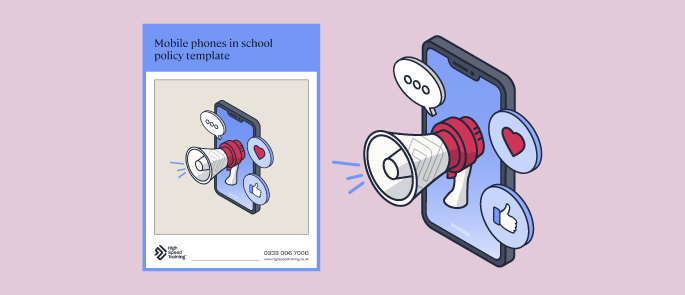Mobile Phones in Schools Policy: Free Template
The impact of mobile phones in schools continues to be a topic of significant debate within the world of education. Whilst many understand the importance of mobile phones for safety, as it enables parents to communicate with their child throughout the day, smartphones are an undeniable source of distraction which can take away from a child’s learning experience.
In response to the debate, many schools are introducing policies regarding the use of mobile phones in schools. These policies are intended to limit the negative impact of phones and prioritise a distraction free learning environment.
In this article we will outline everything you need to know about creating a mobile phone policy for your school. We will also provide a free template which you can download and adapt to suit your school’s needs.
What is a Mobile Phones in School Policy?
A mobile phones in school policy sets clear rules and expectations regarding the use of mobile phones. It may ban phones completely or just during certain times of the school day. The scope of a mobile phone policy is down to your individual school but it should clearly communicate the rules regarding the use of mobile phones, as well as the ramifications for students that breach the policy. All schools should have a behaviour policy that aligns with their legal responsibilities regarding children’s welfare. A school may choose to include rules pertaining to the use of mobile phones within this policy, or have a separate policy that goes into more detail.

A separate mobile phones policy enables a school to be specific about what is and isn’t allowed as well as what devices are prohibited. For example, a school may choose to include smart watches and any other smart technology that can send and/or receive messages, images, or videos within their policy. Comparatively, a school may choose to have different rules for older pupils such as those in sixth form, to better reflect their increased independence. A separate policy therefore provides the scope to make the expectations in different circumstances clear.
It’s not currently mandatory for a school to have a mobile phones in school policy, nor is it currently mandatory for them to be banned. However, guidance from the Department for Education (DfE) clearly states their stance that all schools should prohibit the use of mobile phones throughout the school day, not only during lessons but break and lunchtimes as well. Whilst the DfE’s guidance is non-statutory, it highlights the government’s view on the detrimental impact of mobile phones and reiterates a school’s responsibility to reduce this impact in order to establish a calm, safe and supportive learning environment.
What Should a School Phone Policy Include?
The debate surrounding mobile phones in schools is multifaceted and whilst there are obvious cons, there are some undeniable pros to pupils having their phones during the school day. It’s important that you take the time to consider the arguments for and against mobile phones as this will guide your own school’s policy and what it includes.
As mentioned above, the scope of your mobile phone policy will be determined by your individual school and the needs of your students. However, key information that all mobile phone policies should include are:
- Rules – Any policy you produce regarding mobile phones, whether it be part of a behaviour policy or a standalone policy, must clearly state what the rules are regarding the use of mobile phones. There can be no ambiguity surrounding their use and you should use accessible language to clearly convey the rules. The policy should establish the rules for students, staff and visitors and make it clear what differences, if any, there are regarding the use of mobile phones for these groups.
- Devices – Modern technology is incredibly advanced and there are many other devices that are as equally distracting as mobile phones. For example, some smart watches are able to send and receive messages in the same way mobile phones can. Moreover, depending on your school’s policies regarding electronic devices, some students may use their own tablets in class to take notes etc. These devices can be just as distracting as a mobile phone when not used appropriately. Any policy regarding the use of mobile phones should clearly state what other devices are included and therefore prohibited or limited due to their distracting capabilities.

- Consequences – In order to be effective, policies should have consequences of some kind to act as a deterrent. This needs to be clearly conveyed in the policy so that students and parents alike are aware of the ramifications for breaching the policy. This could include the confiscation of the device or detention depending on what your school deems appropriate. Ensure that any sanctions are reasonable and proportionate. Schools have the power to confiscate mobile phones or similar devices as part of a disciplinary action, for example as a sanction for breaching a mobile phones policy. The law protects staff from liability in any proceedings brought against them for any loss or damage to items they have confiscated, provided that they acted lawfully. Any policy that you create should clearly state the conditions in which a phone would be confiscated. Before confiscation all staff should take the time to consider whether it is the proportionate response or whether another course of action would be appropriate.
- Exemptions – Schools may choose to have different rules pertaining to mobile phones for different years, reflecting their age, maturity and growing independence. For example, sixth form students may be allowed to use their mobile phones during lunch and break, whilst younger students are prohibited from using them throughout the entire day. Moreover, some students may have different responsibilities than others, such as carer responsibilities, which means that they need to be contactable should an emergency arise. Under the Equality Act 2010 schools have a duty to take reasonable steps to avoid substantial disadvantages to disabled students that may be caused by a school’s policies or practices. In some instances, the reasonable steps may be allowing a disabled student to have access to their phone due to the nature of their disability. Maintained schools, those which are funded and controlled by the local education authority, have a duty under the Children and Families Act 2014 to support pupils with medical conditions. In some instances, this may necessitate allowing a pupil to have access to their phone. For example, a diabetic student may have a continuous glucose monitor which is linked to their mobile phone and monitors their blood sugar levels throughout the day. Under the act, it would be unreasonable for a school to prevent a student from having access to their phone as it helps them to effectively manage their medical condition. Your policy should clearly state whether there are any exemptions and touch upon the criteria that may make a pupil eligible for exemption. It is difficult to make an exhaustive list of all the reasons someone may be exempt, so you may choose to use the policy to signpost who should be contacted to approve exemption.

- Loss, theft or damage – Pupils bring their mobile phones and other devices to school at their own risk. As mentioned above, staff are protected by the law against any liabilities brought against them for the loss or damage of a confiscated mobile phone. However, it would be wise to include this in the policy and make it clear that the school accepts no responsibility for mobile phones that are lost, damaged or stolen on school grounds. Depending on how your school decides to implement a ban, such as requiring students to hand in their phones at the start of each day, it may be necessary to ensure that mobile phones are clearly and securely labelled to prevent loss. Including this within the policy clarifies a student’s responsibilities to help reduce the risk of loss or theft.
Depending on the size of your school and the scope of your policy, namely which years will be impacted, you may decide to have students and/or parents sign your mobile phones in school policy. In the UK those under 18 can’t legally enter into agreements such as contracts, so their signature would in no way be legally binding. However, it can be used to indicate that a student and/or their parent or guardian has read through the policy in its entirety and that they agree to the conditions and understand the potential consequences of breaching the policy.
You may also decide to start your policy with a statement of intent or an introduction that conveys why you have the policy. When students are told why they are required to do something they are much more likely to follow the rules. It also gives you the chance to explain the rationale behind limiting or prohibiting phones so that students understand that it isn’t something you are doing simply to be cruel, but to provide a distraction free environment in which they can learn.
Want to Learn More?
Mobile phones can have an incredibly detrimental effect on students and their learning and though they have their benefits, their ability to freely access the internet brings with it certain risks. Our Online Safety & Harms course is designed to support you in protecting children online by teaching you everything you need to know about the potential risks and signs of online harm or abuse.
Mobile Phones in School Policy Template
Below you will find a mobile phones in school policy template that you can download and adapt to suit the needs of your school. The template has been broken down into sections and you can adapt each section as necessary. It is vital that you take the time to read through and adapt the template to suit your school. As such, some sections are intentionally sparse so that you can input the relevant information, such as who is and isn’t exempt from having their mobile phones on them or who is responsible for reviewing and updating the policy.
The template provided bans mobile phones entirely throughout the school day, however your school may choose to adapt this. Moreover, you may wish to produce a separate slip for visitors with a brief overview of the policy so that they can adhere to the rules whilst on school grounds without having to necessarily read through the entire policy. You may also wish to create a slip for pupils who are exempt which they can produce to show staff should they be seen using their mobile phone when it is typically not allowed by other students. However, a student’s exemption may be due to personal reasons which they justifiably do not want displayed on a form. You may instead choose to inform staff of which students are exempt on a case-by-case basis.
To ensure that students who are exempt from a mobile phones policy continue to experience a distraction free environment and to reduce any potential distraction to other students, some mobile phone policies encourage students to purchase mobile phones without cameras or the ability to access the internet. Whilst this would be inappropriate for students who are exempt for medical reasons, as they are likely to need internet access for apps pertaining to their health, for those who simply need to be contactable, non-smart mobile phones ensure that they can communicate with whomever necessary without additional distractions. Schools cannot force a student to purchase a non-smart phone and there is a financial implication that must be considered, however it could prove to be a useful middle ground for some students and schools.
A mobile phones in school policy sets clear rules and expectations regarding the use of mobile phones. It can help you to limit the inherently distracting nature of mobile phones and supports the creation of a calm, focused learning environment in which your pupils can thrive.
Further Resources:
- Mobile Phones in Schools Debate: Advantages and Disadvantages
- Internet Safety Posters for Schools
- Online Safety & Harms












